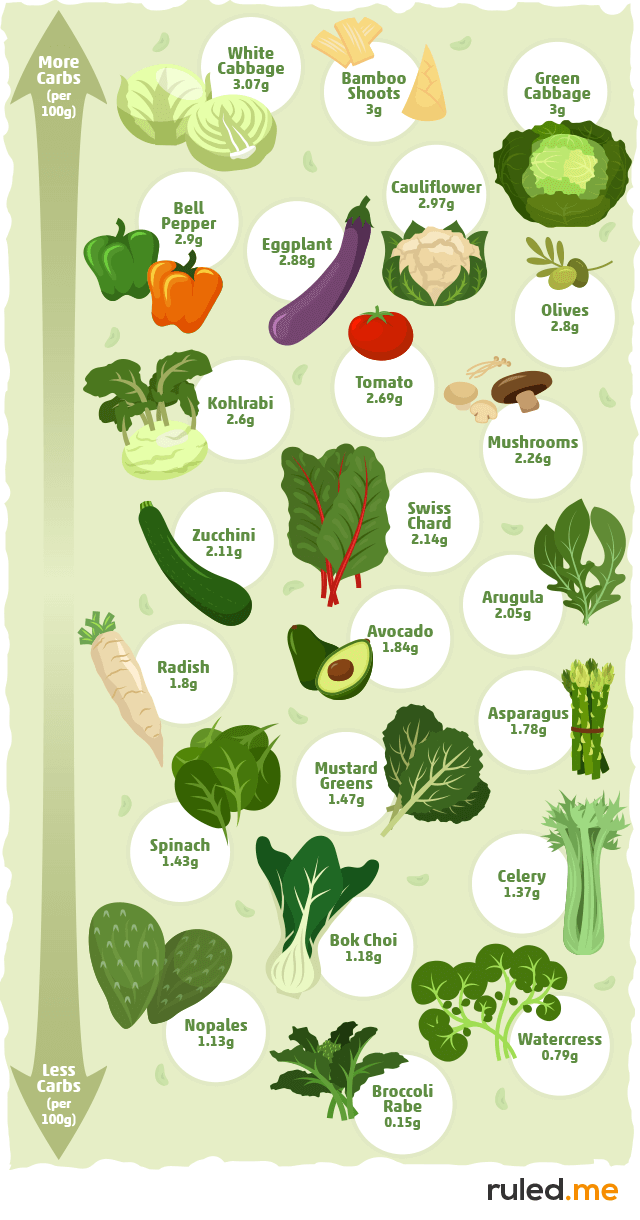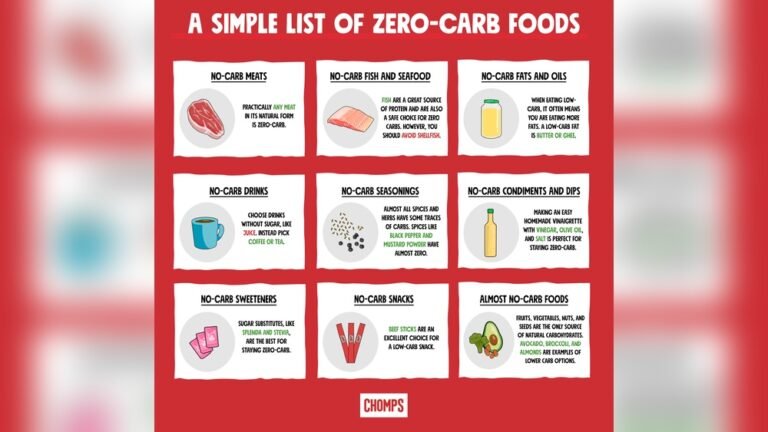Are you looking to cut carbs but still want delicious, satisfying meals? Knowing which foods contain little to no carbohydrates can make a huge difference in reaching your health goals.
This non carbohydrates food list will help you discover tasty options that keep your meals exciting and your body fueled. Ready to find out what you can eat without worrying about carbs? Keep reading, and you’ll have a clear, easy guide that makes healthy eating simple and enjoyable.
What Are Non-carbohydrate Foods
Non-carbohydrate foods are items that contain little or no carbohydrates. These foods are mostly made up of protein, fats, or water. People who want to control their blood sugar or reduce carb intake often choose these foods. They help keep energy levels stable without the spikes from carbs.
Understanding what non-carbohydrate foods are can help you make better diet choices. These foods support muscle growth, repair, and overall health. They also aid in feeling full longer, which can help with weight management.
What Defines Non-carbohydrate Foods?
Non-carbohydrate foods have very low or zero grams of carbs. They do not raise blood sugar levels significantly. Examples include meats, fish, eggs, and fats. These foods provide essential nutrients without carbohydrates.
Common Types Of Non-carbohydrate Foods
Meat and poultry like chicken, beef, and pork have no carbs. Fish and seafood are also free of carbohydrates. Eggs provide protein without carbs. Oils and butter contain fat but no carbs. These foods are staples in low-carb diets.
Why Choose Non-carbohydrate Foods?
They help control blood sugar and insulin levels. These foods support weight loss by reducing hunger. They provide important vitamins and minerals without added sugars. Non-carb foods are important for those with diabetes or on keto diets.
Benefits Of Carb-free Eating
Eating foods without carbs can help control blood sugar and support weight loss. Many non-carbohydrate foods like meats, fish, and eggs provide essential nutrients. Choosing these foods may improve energy and reduce hunger throughout the day.
Improved Weight Management
Eating carb-free foods helps control hunger better. Protein and fats keep you full longer. This lowers the chance of overeating. As a result, weight loss becomes easier and more natural.
Stable Blood Sugar Levels
Carb-free meals prevent sudden blood sugar spikes. This helps avoid energy crashes and mood swings. It supports better focus and steady energy throughout the day. People with diabetes may find it especially helpful.
Better Heart Health
Reducing carbs can improve cholesterol levels. It lowers bad cholesterol and raises good cholesterol. This change helps reduce the risk of heart diseases. Eating more healthy fats supports heart function.
Enhanced Mental Clarity
Low-carb eating often leads to clearer thinking. The brain uses fats and ketones for energy. This can improve focus and reduce brain fog. Many people report feeling sharper and more alert.
Reduced Inflammation
Carb-free diets may lower inflammation in the body. Less inflammation helps reduce pain and swelling. It also supports better joint health. This benefit can improve overall well-being.
Meat And Poultry Options
Meat and poultry are top choices for non-carbohydrate foods. They provide protein without carbs. These options fit well in low-carb and keto diets. Meat and poultry also offer essential vitamins and minerals. They help build muscle and keep you full longer.
Beef Cuts
Beef is rich in protein and zero carbs. Choose cuts like ribeye, sirloin, and ground beef. Grass-fed beef has more omega-3 fats. Beef also contains iron and vitamin B12. These nutrients support energy and brain health.
Chicken Varieties
Chicken is lean and low in carbs. Skinless breast offers high protein with little fat. Dark meat like thighs and drumsticks has more fat. Chicken also contains niacin and selenium. These support metabolism and immunity.
Pork Choices
Pork includes tenderloin, chops, and bacon. Most cuts have no carbohydrates. Pork provides thiamine, which aids in energy use. Choose lean cuts to reduce fat intake. Pork adds variety to your non-carb meals.
Lamb Selections
Lamb is a flavorful, carb-free meat. It contains healthy fats and protein. Lamb also provides zinc and vitamin B6. These help the immune system and brain function. Try lamb chops or ground lamb for meals.
Turkey Options
Turkey is a lean protein source with no carbs. Breast meat is the leanest part. Dark turkey meat has more fat and flavor. Turkey is rich in protein and selenium. It supports muscle health and thyroid function.

Credit: www.thelittlepine.com
Seafood Choices
Seafood is an excellent choice for those avoiding carbohydrates. It provides high-quality protein and healthy fats. Most seafood contains almost zero carbs, making it perfect for low-carb diets.
It also offers important vitamins and minerals, like omega-3 fatty acids, vitamin D, and selenium. These nutrients support heart health and brain function. Seafood is versatile and can be cooked in many ways.
Fish Options With No Carbs
Many fish have no carbohydrates at all. Salmon, tuna, mackerel, and cod are top picks. They are rich in protein and omega-3s. Grilling or baking fish keeps it healthy and tasty.
Shellfish Choices
Shrimp, crab, and lobster also have very low carbs. They provide good protein and minerals like zinc. Shellfish can be steamed, boiled, or added to salads for variety.
Benefits Of Eating Seafood
Seafood supports muscle growth and repair due to high protein. Omega-3s reduce inflammation and improve heart health. Eating seafood regularly may boost brain health and mood.
Eggs And Dairy Products
Eggs and dairy products are rich sources of protein and other nutrients. They contain very little or no carbohydrates. This makes them ideal for people who want to reduce carb intake. These foods help keep you full and provide essential vitamins and minerals.
Eggs: A Low-carb Protein Source
Eggs contain almost zero carbohydrates. They are packed with high-quality protein. Each egg has about 6 grams of protein and less than 1 gram of carbs. Eggs also provide important nutrients like vitamin B12, vitamin D, and choline. They are easy to cook and very versatile in meals.
Dairy Products With Minimal Carbs
Most natural dairy products have low carbohydrate levels. Cheese, butter, and heavy cream have almost no carbs. Yogurt and milk have some carbs, mainly as lactose. Choose plain, unsweetened versions to keep carbs low. Dairy gives calcium, vitamin D, and healthy fats. These nutrients support bone health and energy.
Choosing The Best Dairy For Low-carb Diets
Opt for full-fat dairy products to reduce carb intake. Full-fat options usually contain fewer carbs than low-fat ones. Check nutrition labels for exact carbohydrate content. Avoid flavored or sweetened dairy products. They often have added sugars, increasing carb counts.
Fats And Oils
Fats and oils are important parts of a healthy diet. They do not contain carbohydrates. Instead, they provide energy and help the body absorb vitamins. These nutrients also support brain health and protect organs.
Fats and oils come in many forms. Some are better for health than others. Knowing which fats to choose helps maintain good health and avoid illnesses.
Types Of Fats And Oils
There are three main types: saturated, unsaturated, and trans fats. Saturated fats come from animal sources like butter and cheese. Unsaturated fats come from plants and fish. Trans fats are made during food processing and are harmful.
Healthy Fats To Include
Good fats include olive oil, avocado oil, and fish oil. These help lower bad cholesterol and support the heart. Nuts and seeds also provide healthy fats and are easy to add to meals.
Fats To Limit
Avoid too much butter, lard, and fatty meats. These fats raise cholesterol and increase health risks. Stay away from foods with trans fats. They are often in fried and processed snacks.
Using Fats And Oils In Cooking
Choose oils with a high smoke point for frying, like avocado or peanut oil. Use olive oil for salads and low-heat cooking. Use fats in small amounts to control calorie intake.
Low-carb Vegetables
Low-carb vegetables are an excellent choice for people watching their carbohydrate intake. These vegetables provide essential nutrients without adding many carbs. They help maintain energy levels and support overall health.
Eating low-carb vegetables can keep blood sugar stable. They also add fiber, vitamins, and minerals to your diet. These veggies are versatile and can be enjoyed raw, cooked, or in salads.
Leafy Greens
Leafy greens like spinach, kale, and lettuce have very few carbs. They are rich in vitamins A, C, and K. These greens are perfect for salads and smoothies. They fill you up without adding many calories.
Cruciferous Vegetables
Broccoli, cauliflower, and Brussels sprouts belong to this group. They contain fiber and antioxidants. These vegetables help improve digestion and fight inflammation. They can be roasted, steamed, or eaten raw.
Zucchini And Summer Squash
Zucchini is low in carbs and high in water content. It works well in stir-fries and as a pasta substitute. Summer squash also has a mild flavor and few carbohydrates. Both are great for light meals.
Cucumbers
Cucumbers have very few carbs and high water content. They help keep you hydrated and refreshed. Sliced cucumbers add crunch to salads and snacks. They are easy to grow and widely available.
Nuts And Seeds
Nuts and seeds are an excellent choice for those avoiding carbohydrates. They provide healthy fats, protein, and important nutrients. These foods keep you full and energized without adding carbs.
Including nuts and seeds in your diet supports heart health and helps control blood sugar. They also contain fiber, which aids digestion. These small foods pack a big nutritional punch.
Almonds
Almonds are low in carbs and high in healthy fats. They contain vitamin E, magnesium, and protein. Almonds make a great snack or salad topping.
Walnuts
Walnuts provide omega-3 fatty acids and antioxidants. Their carb content is very low. Walnuts help improve brain function and reduce inflammation.
Chia Seeds
Chia seeds are rich in fiber and omega-3 fats. They absorb water and swell, helping you feel full. These tiny seeds contain almost no digestible carbs.
Flaxseeds
Flaxseeds offer fiber, protein, and healthy fats. They support digestion and heart health. Flaxseeds can be added to smoothies or yogurt.
Pumpkin Seeds
Pumpkin seeds are a good source of magnesium and zinc. They are low in carbs and high in protein. Snack on them or add to salads for crunch.
Herbs And Spices To Enhance Flavor
Herbs and spices bring life to any meal without adding carbohydrates. They offer rich flavors and aromas that make food exciting. Using them helps keep dishes healthy and tasty. Many herbs and spices also provide antioxidants and vitamins.
Sprinkling these natural seasonings can turn simple meals into delicious experiences. They fit perfectly in low-carb diets. Let’s explore some popular herbs and spices that enhance flavor without carbs.
Fresh Herbs For Vibrant Taste
Fresh herbs like basil, cilantro, and parsley brighten dishes. They add a fresh, clean taste. These herbs work well in salads, soups, and grilled foods. Their low carb content makes them ideal for any diet.
Spices That Add Warmth And Depth
Spices such as cinnamon, cumin, and paprika give warmth to meals. They create depth and richness. These spices blend well in stews, roasted vegetables, and meat dishes. Use them sparingly to avoid overpowering flavors.
Dried Herbs For Long-lasting Flavor
Dried herbs like oregano, thyme, and rosemary keep well in the pantry. They offer intense flavor even in small amounts. Perfect for sauces, marinades, and slow-cooked dishes. Their carb count remains very low.
Chili And Pepper For A Spicy Kick
Chili powder and black pepper bring heat and excitement. They stimulate the taste buds and add zest. Use these spices to spice up meats, eggs, and vegetables. They do not add carbohydrates.

Credit: www.ruled.me
Meal Ideas With Non-carb Foods
Meal ideas with non-carb foods offer variety and nutrition without extra carbohydrates. These meals focus on proteins, healthy fats, and low-carb vegetables. They help maintain energy and support weight management. Simple, tasty dishes keep your diet interesting and satisfying.
Non-carb meals suit breakfast, lunch, or dinner. Use fresh ingredients and basic cooking methods. The result is healthy plates with bold flavors and good texture.
Breakfast Options With Non-carb Foods
Start your day with eggs cooked in olive oil or butter. Add avocado slices for healthy fats. Serve with bacon or sausage for extra protein. Omelets with spinach, mushrooms, and cheese make a filling breakfast. Plain Greek yogurt with nuts and seeds also works well.
Lunch Ideas Using Non-carb Ingredients
Grilled chicken or fish with a side of leafy greens makes a quick lunch. Toss salad with olive oil, lemon, and herbs for fresh taste. Use zucchini noodles or cauliflower rice to replace carbs. Egg salad or tuna salad wrapped in lettuce leaves offers easy options. Include cheese or olives for flavor.
Dinner Meals Focused On Non-carb Foods
Roast beef, pork, or salmon with steamed broccoli or asparagus creates a hearty dinner. Cook vegetables with garlic and butter for added richness. Cauliflower mash replaces potato mash well. Stir-fry shrimp or chicken with bell peppers and snap peas for variety. Keep portions balanced to feel full and satisfied.
Common Mistakes To Avoid
Choosing non-carbohydrate foods can improve health and energy. But many make common mistakes that slow progress. Avoiding these errors helps you stay on track and feel better.
Understanding these mistakes saves time and effort. It makes your diet clearer and more effective. Focus on simple, clear steps to avoid confusion and frustration.
Not Reading Food Labels Carefully
Some foods labeled low-carb still contain hidden carbs. Always check the nutrition facts and ingredient list. Watch for sugars, starches, and fiber that add carbs.
Ignoring Portion Sizes
Eating large portions of non-carb foods can still add calories. Control portion sizes to maintain balance and avoid unwanted weight gain. Small servings keep meals healthy.
Overlooking Hidden Sugars In Processed Foods
Processed foods often have added sugars. These increase carbohydrate intake without clear signs. Choose whole foods and avoid packaged items with sugar on the label.
Failing To Include Enough Protein And Fats
Non-carb foods include protein and fats. Skipping these can cause hunger and low energy. Include lean meats, eggs, nuts, and healthy oils for balance.
Assuming All Vegetables Are Carbohydrate-free
Some vegetables have more carbs than others. Starchy vegetables like potatoes and corn contain more carbs. Choose leafy greens and non-starchy options for fewer carbs.

Credit: chomps.com
Tips For Maintaining A Carb-free Diet
Maintaining a carb-free diet can feel challenging at first. It requires focus and smart choices. This section offers practical tips to help stay on track with low-carb eating. Each tip aims to make the journey easier and more enjoyable.
Plan Meals Ahead
Planning meals ahead saves time and avoids last-minute carb temptations. Prepare menus with non-carbohydrate foods like meats, eggs, and vegetables. Keep simple recipes ready to reduce stress during busy days.
Read Food Labels Carefully
Always check food labels for hidden carbs. Many packaged foods contain sugars or starches. Look for ingredients like sugar, corn syrup, or wheat. Choose items with zero or very low carbs.
Choose Whole Foods
Whole foods are naturally low in carbohydrates. Fresh meats, fish, and eggs fit well. Non-starchy vegetables like spinach and broccoli are good options. Avoid processed foods that often add carbs.
Stay Hydrated
Drinking enough water supports metabolism and reduces cravings. Aim for at least eight glasses daily. Herbal teas and black coffee are also good carb-free drinks.
Snack Smart
Keep low-carb snacks handy to prevent hunger. Nuts, cheese, and boiled eggs work well. Avoid chips, crackers, and sweets that contain carbs.
Track Your Progress
Tracking food intake helps identify hidden carbs. Use a food diary or app to monitor daily consumption. Adjust choices based on your goals and feelings.
Conclusion
Non-carbohydrate foods offer many healthy choices. They help keep blood sugar steady. Foods like meat, fish, eggs, and vegetables fit well. They provide protein, fats, and essential nutrients. Eating these foods supports energy and body function. Try adding them to your daily meals.
Small changes lead to better health over time. Choose foods that nourish your body best. Remember, balance is key to good nutrition. Keep exploring these options for a healthy lifestyle.


